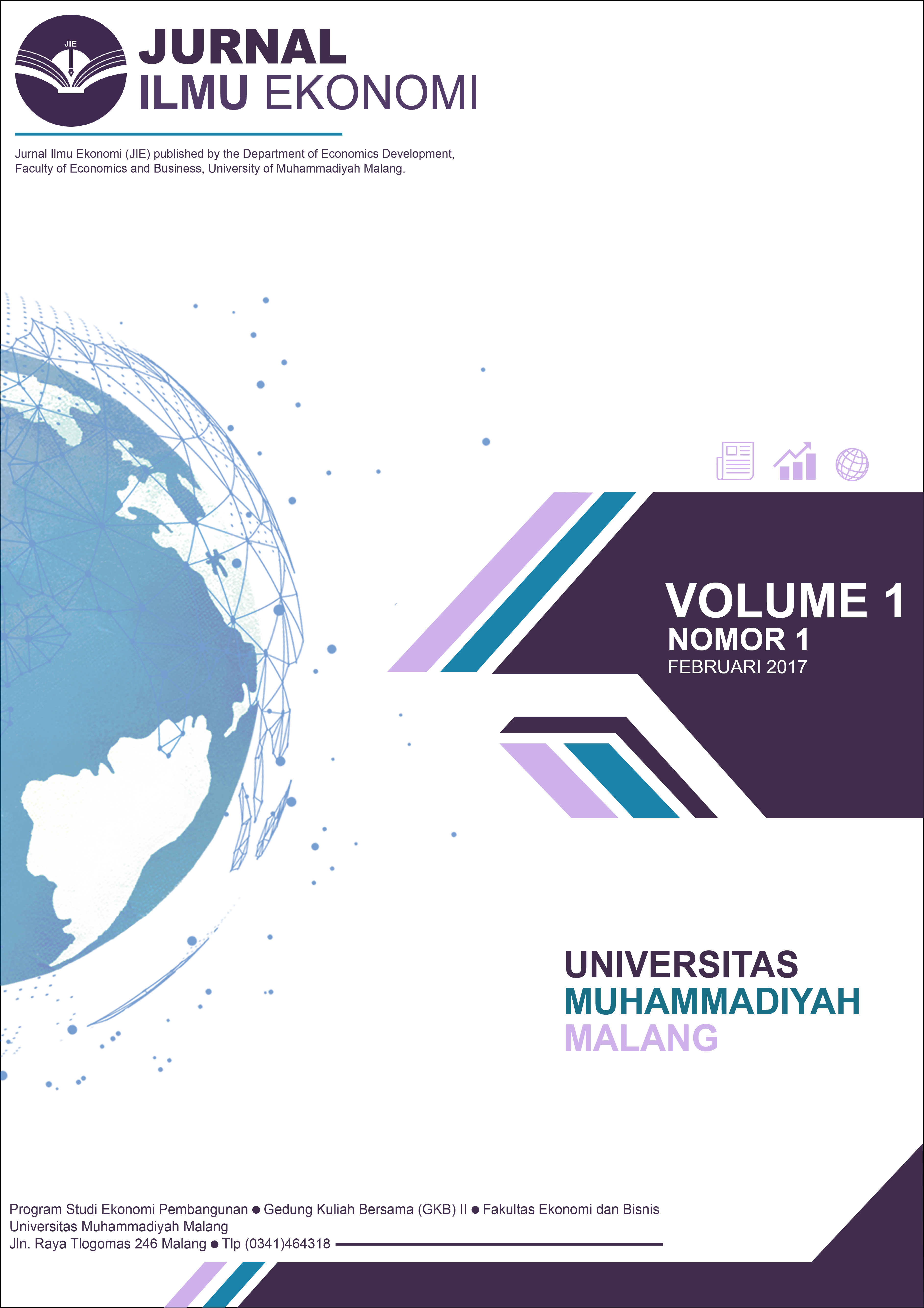ANALISIS FAKTOR-FAKTOR YANG MEMPENGARUHI UTANG LUAR NEGERI DI INDONESIA
DOI:
https://doi.org/10.22219/jie.v1i1.5408Abstract
The purpose of the research is to describe how the influence of budget deficit, foreign exchange reserves, net exports and foreign debt of the previous year against foreign debt in Indonesia. Instrument analysis used is the method linear regression multiple with the methods ols with the data time series.With the methods testing the assumption classical and by test statistics like a test t and F test. The results of the analysis what have been done by researchers the results that on partial foreign exchange reserves (CDV) have had a positive impact and foreign debt of the previous year (ULNt-1) have had a positive impact and influential but not significant is namely the budget deficit (DA) and net exports (NX).Simultaneously of the four variable influential in significant impact on foreign debt.With the coefficients R2 of 99.91. Conclusions from research has been done that the variable that influence the foreign debt in Indonesia is foreign exchange reserves and foreign debt year earlier, and influential but not significant variables to external debt are the budget defisit and net exsport.
Keywords: foreign debt , the budget deficit , foreign exchange reserves , net exportsDownloads
References
Aryani, F. (2017). Ini Rasio Utang Pemerintah RI Dari Era Soeharto sampai Jokowi. Retrieved from http://m.liputan6.com/bisnis/read/2854387/ini-rasio-utang-pemerintah-ri-dari-era-soeharto-hingga-jokowi
Bachtiar. (2016). Dua Tahun Era Jokowi Utang Indonesia Rp 326352 Triliun. Retrieved from ttp://teropongsenayan.com/39983-dua-tahun-era-jokowi-utang-indonesia-rp-326352-triliun
Harahap, M. D. M. (2007). Analisis Faktor-Faktor Yang Mempengaruhi Utang Luar Negeri Indonesia. Ekonomi.
I Wayan Galuh Widharma , I. M. K. S. B., dan A A I N Marhaeni. (2011). Utang Luar Negeri Pemerintah Indonesia: Kajian Terhadap Faktor-Faktor Yang Berpengaruh. Ekonomi.
Kuncoro, M. (2009). Metode Riset untuk Bisnis dan Ekonomi. Jakarta: Erlangga.
Kusuma, H. (2016). Desentralisasi Fiskal dan Pertumbuhan Ekonomi di Indonesia. Ekonomi dan Pembangunan.
S, W. S. d. M. (2005). Dilema Utang luar negeri Indonesia dalam perekonomian Nasional. Ekonomi Pembangunan.
Satrianto, A. (2014). Analisis Determinasi Defisit Anggaran Dan Utang Luar Negeri di Indonesia. Ekonomi.
Suliswanto, M. S. W. (2016). Tingkat Keterbukaan Negara Ekonomi di ASEAN. Ekonomi.
Susilowati, D. (2002). Dampak Utang Luar Negeri terhadap Tabungan Domestik dan Ekspor di Indonesia. Ekonomi.
Tambunan, T. T. H. (2011). Perekonomian Indonesia : Kajian Teoritis dan Analisis Empiris. Bogor: Ghalia Indonesia.
Zuhroh, I. (2009). Pengaruh bunga luar negeri federal reserve (The FED), Nilai tukar Rupiah (Rp/$) dan inflasi terhadap nilai harga saham gabungan di bursa efek indonesia tahun 2006 s.d 2008. Ekonomi Pembangunan.
Zuhroh, I. (2016). Komparasi Kinerja Keuangan Bank Nasional dan Bank Asing 2010 s.d 2015 Ekonomi Pembangunan.
Downloads
Published
How to Cite
Issue
Section
License
Copyright (c) 2018 Jurnal Ilmu EKonomi JIE

This work is licensed under a Creative Commons Attribution-ShareAlike 4.0 International License.
Authors who publish with this journal agree to the following terms:
- For all articles published in the JIE (Jurnal Ilmu Ekonomi), copyright is retained by the authors. Authors give permission to the publisher to announce the work with conditions. When the manuscript is accepted for publication, the authors agree to the automatic transfer of non-exclusive publishing rights to the publisher.
- Authors retain copyright and grant the journal right of first publication with the work simultaneously licensed under a Creative Commons Attribution-NonCommercial-ShareAlike 4.0 International License that allows others to share the work with an acknowledgement of the work's authorship and initial publication in this journal.
- Authors are able to enter into separate, additional contractual arrangements for the non-exclusive distribution of the journal's published version of the work (e.g., post it to an institutional repository or publish it in a book), with an acknowledgement of its initial publication in this journal.
- Authors are permitted and encouraged to post their work online (e.g., in institutional repositories or on their website) prior to and during the submission process, as it can lead to productive exchanges, as well as earlier and greater citation of published work (See The Effect of Open Access).
This is an open access article and licensed under a Creative Commons Attribution-NonCommercial-ShareAlike 4.0 International License








